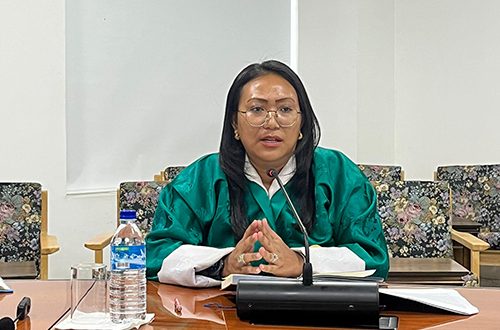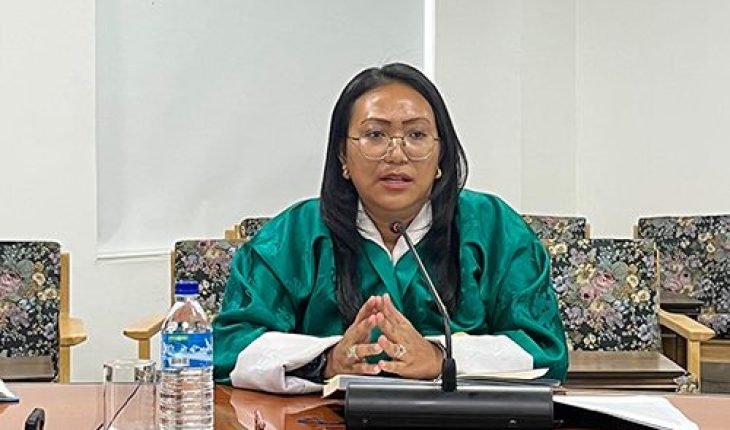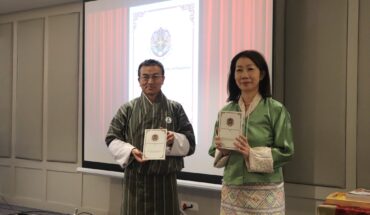
TIL BDR GHALLEY | Thimphu
The Ministry of Education and Skills Development (MoESD) is taking stronger measures to address the significant performance gap among children with disabilities, particularly in Mathematics, highlighted in the National Education Assessment 2024 for Grade III and VI students, while Lyonpo Yeezang De Thapa, Minister for MoESD, emphasizing the urgent need for targeted interventions to ensure equitable learning outcomes for all.
“The National Education Assessment 2024 – Grade III and VI Report shows that children with disabilities underperformed significantly in Mathematics. This finding calls for stronger interventions to ensure equitable learning outcomes for all students,” Lyonpo Yeezang De Thapa stated.
In response, the Ministry is implementing a series of reforms aimed at enhancing education for students with diverse learning needs. Key among these is the adaptation of curricula and provision of learning materials in multiple accessible formats. Students will now have access to educational content in Braille, large print, audio, and digital versions equipped with accessibility features.
Teachers are being prepared through expanded in-service training that focuses on inclusive pedagogy, differentiated instruction, and the use of assistive technologies. The training also includes specific modules on strategies for teaching Mathematics to learners with disabilities, addressing the subject where underperformance is most pronounced.
“The Ministry is equipping teachers through expanded in-service training on inclusive pedagogy, differentiated instruction, and the use of assistive technologies, with specific modules on strategies for teaching Mathematics to learners with diverse needs,” Lyonpo explained.
Special Education Needs (SEN) focal teachers and resource units are being strengthened to support individualized education plans, classroom accommodations, and targeted numeracy interventions. This is complemented by collaboration with health professionals and international agencies to provide interventions in speech, language, and neurodiversity, ensuring a holistic approach to learning.
Infrastructure and assistive technology are also a focus of the reforms. The Ministry is upgrading SEN units and resource rooms across schools and piloting digital tools specifically designed for learners with disabilities. These measures aim to create a more inclusive and supportive learning environment catering to a range of needs and abilities.
Advanced studies are being promoted to build a cadre of specialists in inclusive education. The Master’s program in Inclusive Education at Paro College of Education is providing advanced training, while immersion and exchange opportunities are helping spread best practices nationwide.
To sustain these reforms, the Ministry has allocated Nu. 100 million under the 13th Five-Year Plan for capacity building in inclusive education. This funding supports teacher training, infrastructure upgrades, and integration of assistive technologies, as well as policy reforms aimed at fair and inclusive student assessment.
“Collectively, these measures are intended to close the learning gap and enable students with disabilities to thrive,” Lyonpo Yeezang De Thapa said.
Inclusive education is not only about physical access to classrooms but also about ensuring that all students have equitable opportunities to learn, participate, and achieve. By investing in teacher capacity, adaptive curricula, and assistive technologies, Bhutan is taking critical steps to ensure that children with disabilities are not left behind.
The reforms are also expected to strengthen collaboration between schools, families, and specialized service providers. Health professionals, including speech and language therapists and neurodiversity specialists, are engaged to support students holistically, addressing barriers to learning both inside and outside the classroom.
While challenges remain, particularly in scaling initiatives nationwide, the Ministry’s comprehensive strategy signals a strong commitment to equity in education. By targeting underperformance in Mathematics and enhancing learning resources and teacher skills, MoESD aims to create an educational system where students with disabilities can reach their full potential.
As the country moves forward with these reforms, continuous monitoring and evaluation will be critical to measure progress, adapt strategies, and ensure no child is left behind. The 2024 National Education Assessment highlighted the gaps; the Ministry’s response demonstrates a clear roadmap to bridging them through policy, training, technology, and infrastructure.





